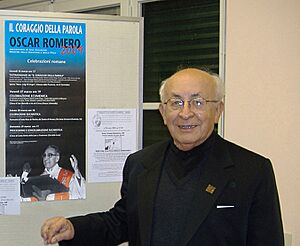Tomás Balduino facts for kids
Quick facts for kids Tomás Balduíno, O.P. |
|
|---|---|
| Bishop of Diocese of Goiás (emeritus) | |
 |
|
| Church | Roman Catholic Church |
| See | Diocese of Goiás |
| In Office | 1967 - 1998 |
| Predecessor | Abel Ribeiro Camelo |
| Successor | Eugène Lambert Adrian Rixen |
| Orders | |
| Ordination | July 4, 1948 |
| Personal details | |
| Born | December 31, 1922 Posse, Goiás, Brazil |
| Died | May 2, 2014 (aged 91) Goiânia, Goiás, Brazil |
| Previous post | Prelate |
Tomás Balduíno, O.P. (born Paulo Balduino de Sousa Décio) was an important leader in the Catholic Church in Brazil. He was born on December 31, 1922, and passed away on May 2, 2014. The "O.P." after his name means he was part of the Dominican Order, a group of priests and brothers.
Contents
A Life of Service
Tomás Balduíno began his journey in the church in Posse, Goiás, where he was born. He became a priest on July 4, 1948. He joined the Dominican Order, a religious group known for its focus on teaching and helping others.
Becoming a Bishop
In 1967, Tomás Balduíno was chosen for a special role. On August 15, 1967, he was appointed to help lead the church in an area called Santíssima Conceição do Araguaia. Soon after, on November 10, 1967, he became the main bishop for the Roman Catholic Diocese of Goiás. He officially became a bishop on November 26, 1967.
Helping Farmers and Workers
Bishop Balduíno was very active in helping people. In 1975, he started an important organization called the Comissão Pastoral da Terra (CPT). This group works to support farmers and rural workers, especially those who struggle to own land or face unfair conditions. He was the first president of this organization.
A Voice for Justice
Tomás Balduíno was known for supporting a movement called Liberation theology. This idea focuses on helping poor and oppressed people and working for social justice. He believed the church should stand with those who are struggling.
He retired from his role as bishop on December 2, 1998. Even after retiring, he continued to be an important voice. In March 2009, he traveled to Rome to remember Mgr. Óscar Romero. Romero was another church leader who was killed because he spoke out against injustice.
Images for kids


